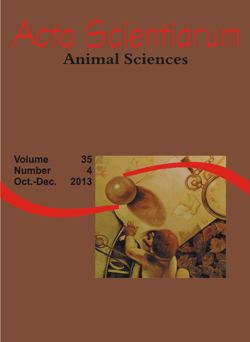<b>Dietary lipid sources affect freshwater catfish jundiá, <i>Rhamdia quelen</i>, survival, when challenged with<i> Aeromonas hydrophila</i></b> - doi: 10.4025/actascianimsci.v35i4.19617
Abstract
The immune modulatory activity of diet long chain polyunsaturated fatty acids in fish has been previously demonstrated, although results for freshwater species are controversial. This study evaluates the effect of different dietary lipids on freshwater catfish jundiá, Rhamdia quelen, survival and its non-specific response (phagocytosis) after being inoculated with the pathogen Aeromonas hydrophila. Five diets were offered to jundiá fingerlings during 150 days prior to challenge: cod liver oil (FO), sunflower oil (SO), linseed oil (LO), canola oil (CO) and coconut oil (CNO). Accumulated mortality was significantly lower in fish fed FO and CNO diets and higher in fish fed LO. In spite of the highest values observed for phagocytotic activity in CNO-fed fish (50.0 + 12.7%) and in FO-fed fish (45.0 + 10.5%) when compared to those fed other diets, no significant differences in phagocytosis were reported. Results show the relevance of a balanced dietary lipid source with adequate concentrations of n-3 and n-6 series of fatty acids to prevent mortality after pathogen challenge.
Downloads
DECLARATION OF ORIGINALITY AND COPYRIGHTS
- I Declare that current article is original and has not been submitted for publication, in part or in whole, to any other national or international journal.
The copyrights belong exclusively to the authors. Published content is licensed under Creative Commons Attribution 4.0 (CC BY 4.0) guidelines, which allows sharing (copy and distribution of the material in any medium or format) and adaptation (remix, transform, and build upon the material) for any purpose, even commercially, under the terms of attribution.
Read this link for further information on how to use CC BY 4.0 properly.









































